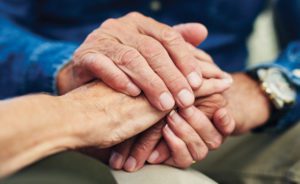Journal of the American Medical Association


Doctors Schulz and Beach published a landmark study in the Journal of the American Medical Association.1 They tracked 819 people, age 66+, who were living with their spouses. Compared to spouses without a caregiving role, spousal caregivers who experienced strain due to the caregiving role had a 4-year mortality increased by 63%. The increase in mortality risk was even higher when spousal caregivers had their own health problems. Among strained spousal caregivers with prevalent disease, the 4-year mortality risk increased more than fourfold.
Senior family caregivers without proper resources lose normal opportunities for selfcare.2 They have interrupted sleep patterns. They are less likely to rest when ill. They skip doctors’ appointments and have other reductions in self-reported health care behaviors. This is the suspected mechanism by which caregiver fatigue causes increased mortality among caregivers.
Statistically significant increased mortality risk only occurred among senior caregivers who reported strain from the caregiving role. Spousal caregivers who reported no strain did not see the same increases. Similarly, seniors with a disabled spouse, but who did not provide caregiving, did not have an increase in mortality risk. The conclusion is that family caregiving can be done safely, but caregiver fatigue is a deadly condition affecting millions of seniors. Families, friends and healthcare providers can be of great service to their patients by looking for caregiver fatigue and by educating senior patients.
Of course, caregiver fatigue is deadly for more than the caregivers. Among people with dementia, when caregivers report needing help with two or more activities of daily living for the person with dementia, the mortality risk of the person with dementia goes up 37%.3 Those people are also 77% more likely to be placed in a facility. Caregiver fatigue proves deadly for both spousal caregivers and the care recipients, not to mention the effects on quality of life. A recommendation for long-term home care can initiate the support needed to correct increased mortality risk and improve quality of life.
McKenney Home Care in Naples, FL hosts a Lewy Body Dementia Support Group on the first Wednesday of every month. This ongoing support group is approved by the Lewy Body Dementia Association in Atlanta and is in affiliation with the Parkinson’s Association of SWFL and the Alzheimer’s Support Network.
For Individuals with neurodegenerative disorders, McKenney Home Care delivers enriched specialized training for its caregivers working with Dementia Patients. In addition to specialized videos and manuals, McKenney educates the caregivers through the use of the Virtual Alzheimer’s App. This virtual reality experience helps caregivers understand the feelings and experience of those suffering from Alzheimer’s and other forms of Dementia.
Along with their medical expertise, McKenney Home Care is a certified Music & Memory Agency. Providing help for Dementia Patients; this specialized music therapy program is highly personalized and has been shown to reduce the need for anti-anxiety and antipsychotic drugs by up to 50%, while brining joy to the lives of patients who have Dementia.
If you or someone you know would like more information about McKenney Home Care or the LBD Support Group, please call McKenney Home Care at 239-325-2273, or visit mckenneyhomecare.com.
McKenney Home Care
CALL US TODAY!
239-325-CARE (2273)
9655 Tamiami Trail North #201, Naples, FL 34108
References:
1. Schulz R, Beach SR. Caregiving as a risk factor for mortality: The Caregiver Health Effects Study. JAMA. 1999 Dec 15; 282 (23): 2215-9.
2. Glajchen M. Physical well-being of oncology caregivers: an important quality-of-life domain. In Seminars in Oncology Nursing. 2012 Nov 1 (Vol. 28, No. 4, pp. 226-235). WB Saunders.
3. Gaugler JE, Kane RL, Kane RA, Newcomer R. Unmet care needs and key outcomes in dementia. Journal of the American Geriatrics Society. 2005 Dec; 53 (12): 2098-105.
 Southwest Florida's Health and Wellness Magazine Health and Wellness Articles
Southwest Florida's Health and Wellness Magazine Health and Wellness Articles
